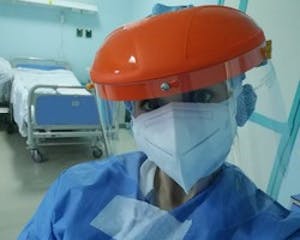In the early days of the COVID-19 pandemic, Italy emerged as an early epicenter of the outbreak, becoming a devastating harbinger of how quickly health systems can collapse and death tolls can rise.
Below is a firsthand account from a 24-year-old nurse in Italy named Laura Lupi. She graduated last year and worked at a hospital in central Italy when she was suddenly called up to help treat COVID-19 patients.
This is her story.

“How we put on our protective equipment at the beginning of each shift determines our fate.”
Laura Lupi is a 24-year-old nurse who works at a COVID-19 hospital in Teramo in the Abruzzo region of Italy.
“Those first 20 minutes of donning our protective gear are imperative to avoid getting infected. I have worked with infectious diseases before, but this virus is different because we just don’t know enough about it.”
Loss in human connection a challenge
“I graduated from my bachelor’s in nursing a year ago and worked in a general surgery and a geriatrics department, but nothing could have prepared me for the professional and emotional challenges I am facing now,” she explains at the end of her first week in the COVID-19 hospital, where she tends to 34 patients.
“I do 7- or 10-hour shifts, during which I cannot eat or drink – we cannot take off our protective equipment once we have put it on.
“At times, it gets hard to breathe and even if I open the window, I cannot feel fresh air.
“Perhaps what is most challenging is the fact that we must keep a physical distance from our patients, which is made worse by the fact that we are entirely covered. Much of the human connection is lost, which is one of the things that made me fall in love with this profession in the first place.”
Constant fear of infection
“On the first day at the COVID-19 hospital, I entered a room where a patient was crying. When I inquired what had happened, he told me his mother-in-law had died and how he regretted not being able to comfort his wife. All I could do to ease his pain was to place a hand on his chest, but he could not even see my face.
“That first day was particularly challenging, but I pulled through.
“When I returned home, I was physically and emotionally drained, and all I wanted was a hug from my mother – but of course, that was not possible. At first, I had to fight the instinct to give up, but I cannot do that to my nurse colleagues. I have to do my job, and I know I can make a difference in my patients’ lives.
“My work has changed profoundly, but so has how I spend the rest of my day. I live with my parents and brother, but I have not spent time with them since starting in this position. I cannot risk infecting them; we cannot share a table at dinner.
“In the past, I used to enjoy thinking back to my workday, knowing that challenging moments could be opportunities for growth. I now live with the constant terror of infecting others and prefer to avoid thinking of work after a shift. Instead, I try to distract myself, to avoid thinking about having been infected or infecting my loved ones.”
I want to hear my patients say, “I have survived COVID-19.”
“We’ve always known that our job, as nurses, carries some risk with it. The difference now is that others know it too. I feel rewarded by the expression of solidarity from everyone; it is gratifying to read that people recognize our role – they truly see us and our work now.
“For the future, I hope to see patients recover and leave the hospital. I know we can beat this virus; we can fight it together. I want to hear discharged patients say, ‘I have survived COVID-19.’ That is what motivates me and keeps me going. We will do everything that is humanly possible to overcome this situation together and we will succeed – we must. Never underestimate us nurses.
“The only thing we ask you is to stay at home for us.
We will stay at work for you.”
As this nurse’s firsthand account illustrates, health workers are the front lines of the fight to stop COVID-19 — and also among the most vulnerable to infection, especially without adequate support. Providing critical resources to doctors, nurses, and other emergency responders will be crucial to stopping the virus.
That’s why we launched the COVID-19 Solidarity Response Fund. It’s the fastest and most effective way for individuals, companies, and organizations to support the World Health Organization (WHO)’s work battling the virus.
WHO is the only organization with the global reach and expertise to lead and coordinate an international response to this once-in-a-century pandemic. In fact, tackling global health emergencies like this one is exactly why WHO exists.
Our growing solidarity movement — which now includes more than 200,000 individuals across the planet and more than 100 companies and organizations — provides urgent, lifesaving support to WHO and health workers like Laura on the front lines of this historic crisis.
This piece originally appeared on WHO.org and has been edited and republished with permission.
Read more about the WHO’s global and country response to COVID-19
DONATE TODAY
Every donation makes a difference. Support WHO’s life-saving efforts to respond to the COVID-19 pandemic by giving to the COVID-19 Solidarity Response Fund. Donations made via Facebook will be matched up to $10,000,000. Through June 30, 2020, for every $1 you donate here, Google.org will donate $2, up to $5,000,000.



 View All Blog Posts
View All Blog Posts



